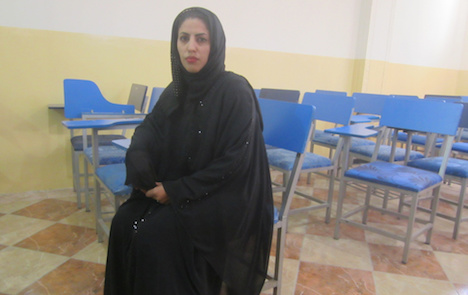Women of Afghanistan: Episode 6 - Zahra Nader
 Print This Print This
By Zahra Nader, Sahar Speaks
Huffington Post
Sunday, Jul 3, 2016
For Afghan Women Seeking Divorce, a Wild Goose Chase
By Zahra Nader
I met Rahima Sadat in Shahr Ara, Kabul's only park designated for women. When I first heard about her story, I thought she might be middle‐aged and traditional. But I found a young and modern woman, wearing a black leather jacket, a blue scarf and a black skirt. Behind her braces, she had a beautiful smile.
Sadat, 24, has spent four years in the corridors of the court getting a divorce from her abusive ex‐husband. She has not seen her 5‐year‐old daughter, Sonam, in years, except in a picture on Facebook.
"Even an educated woman living in the capital cannot achieve justice," she said. "Here, a woman's voice is not heard."
Sadat’s story is not unusual in Afghanistan, a place where women face multiple problems before and after divorce. Divorce through an Islamic religious scholar is typically not possible for women without the consent of their husbands, and getting a divorce in Afghanistan's court system, against their husbands’ will, takes many long years.
Afghanistan’s civil law does not give women the right to divorce. However, women can apply for divorce under exceptional circumstances, such as if a husband does not provide life’s necessities, if a husband has disappeared for at least three years, or if a husband is terminally ill. Women must be able to prove their cases in court.
The courts do not publish statistics about divorce. “Cases of divorce are registered in court archives and the information is not registered electronically anywhere,” said Ahmad Shah Madadi, a family lawyer.
Sadat, like many Afghan women, had a typical marriage, arranged by her family. “Our mutual life started with a lie,” she said. “He said that he is Sunni like us, but after marriage I realized he is Shia.” Sadat’s problems with her ex‐husband grew when he tried to prevent her family from visiting her and became physically violent. “Initially for the sake of my family name, and later for my daughter, I tolerated my husband’s abuses,” she said.
 |
| Rahima Sadat sits in an empty classroom at her university in Kabul, where she is studying law. (Photo: Zahra Nader) |
One cold winter night in early 2011, when her husband kicked her out, Sadat decided never to return to his house. Two years later, in June 2013, she received her divorce. She is currently fighting in court to get her dowry back from her husband.
Getting a divorce in the court system usually takes two to three years, and getting a dowry back can take around four, said Rohullah Habib, deputy director of the Kabul‐based Justice For All. Since its founding in 2009, the NGO has provided free legal services for 2,500 women applying for divorce. Despite repeated attempts, the Supreme Court would not grant me access to interview the chief of the family court.
In recent years, efforts have been made to change laws in favor of women, but these laws have not been able to pass the conservative trenches of parliament. The Afghanistan Independent Human Rights Commission has demanded equal rights to divorce for both women and men. AIHRC has put this in the draft of family law, which is now awaiting parliamentary approval.
“Women in Afghanistan do not have the right to divorce, however, for men it is enough to three times utter the word, ‘divorce, divorce, divorce,’” said Soraya Sobhrang, a commissioner of AIHRC. Afghanistan’s civil law “discriminates against women,” she said, adding that because of how long it takes to obtain a divorce, many women give up and resume living with their abusive husbands.
Other people approach Islamic religious scholars, or mullahs, for divorce. Mohammadi, 26, who got married three years ago, began pursuing her divorce in the office of mullahs four months ago. “I had studied to be a midwife and had many hopes for my future,” Mohammadi said. “But on the second night of my marriage I learned that my husband has a drug addiction. All the castles of my hope came down.”
Mohammadi, who only gave her last name out of fear of retaliation from her in‐laws, tried for a year and a half to help her husband kick the habit. But when he left home and disappeared more than a year ago, she lost hope and returned to her parents’ house.
Mohammadi initially approached the court system for divorce, but she learned she would have had to wait until her husband had been gone for three years. She decided to go to a mullah, but this process, too, has become complicated and drawn out.
After paying a police officer $200 to find her missing husband, she brought him to a mullah. The mullah gave him three months to quit his opium addiction and find a suitable place for them to live. But three months have passed, and Mohammadi’s husband has not delivered on his promises to her and the mullah. The mullah has now asked her to wait another two months.
“Based on Sharia law, women cannot get divorce without their husband’s consent,” said Mohammad Ismail Zahedi, a mullah dealing with cases of divorce.
Sadat, who is now a fourth‐year law student, hopes to help women like Mohammadi. “I suffered a lot in the process of getting my divorce,” she said. “I want in the future to help women who are in my situation. I want to give a voice to women whose voices are not being heard in Afghanistan’s justice system.”
Source URL
|
 Print This Print This

|

